A spate of reforms from the government aimed at removing rules and restrictions on the hospitality industry have been announced. Adam Maidment went to gauge the response.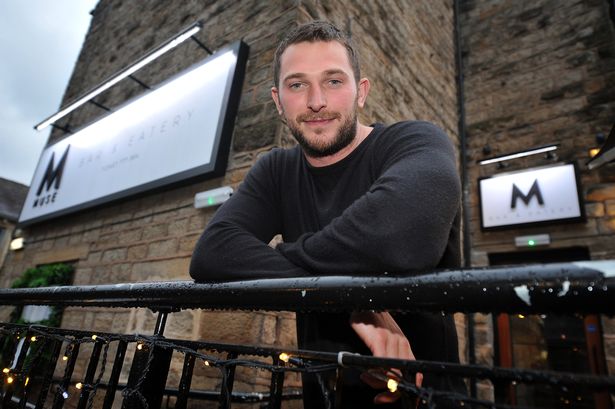 Rob Norbury, who runs Muse in Uppermill and The Farrars Arms pub in Oldham, has spoken about the planned reforms on the hospitality industry(Image: Manchester Evening News)
Rob Norbury, who runs Muse in Uppermill and The Farrars Arms pub in Oldham, has spoken about the planned reforms on the hospitality industry(Image: Manchester Evening News)
Earlier this week, the government announced plans to introduce a series of new reforms which could remove ‘clunky, outdated’ rules and restrictions that would help slash the red tape on the UK’s hospitality industry.
The reforms include plans to overhaul the planning and licensing rules that would make it quicker for new cafes, bars and music venues to open in disused shop locations, as well as ‘fast-tracking’ permissions for ‘hospitality zones’ that will encourage outdoor drinking and dining. It will also potentially make it easier for businesses to apply for extended opening hours.
Across Greater Manchester, the owners of pubs, bars, cafes, hotels and restaurants have reacted to the plans with a mixture of trepidation and positivity on what it could lead to.
Rob Norbury, who runs the Farrars Arms pub in Oldham and Muse in Uppermill, says he fears the reforms are catered more towards new rather than existing businesses and says it’s important not to overlook how they also exclude any relief when it comes to on-going increases on business rates and national insurance.
“I think in terms of cutting the red tape, and making it a little easier for places to extend their licences, that all sounds great but, to be honest, most people are looking for actual financial support right now,” Rob tells the Manchester Evening News.
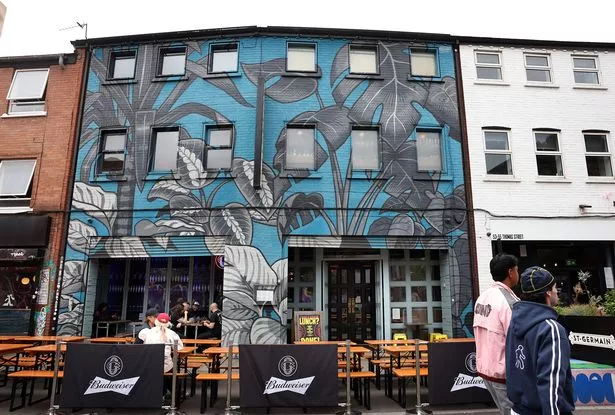 New Government reforms could remove some of the ‘red tape’ impacting pubs, bars, cafes and restaurants(Image: Manchester Evening News)
New Government reforms could remove some of the ‘red tape’ impacting pubs, bars, cafes and restaurants(Image: Manchester Evening News)
“We need assistance with the hikes on business rates and national insurance. Costs keep going up and our margins keep getting tighter, but if we increase our prices then people just won’t come out. Our margins have dropped by around 50% this year.
“It kind of feels to me like when your phone contract is coming up and all of a sudden everyone except your current provider is able to offer you a better deal. A lot of the reforms seem to be designed to help sign new people up rather than those who already have sites and are doing the hard work already.”
It’s something that Neil Burke, who runs The Black Friar in Salford, agrees on. “The best and quickest way to support the hospitality industry would be cash in the bank and that would be through reducing VAT,” he explains.
“We’ve had a £70,000 increase in costs this year. That’s not by doing anything different on our side, that’s from increases heading our way. And then with costs going up, people don’t come out as much because it gets too expensive – it’s really difficult.”
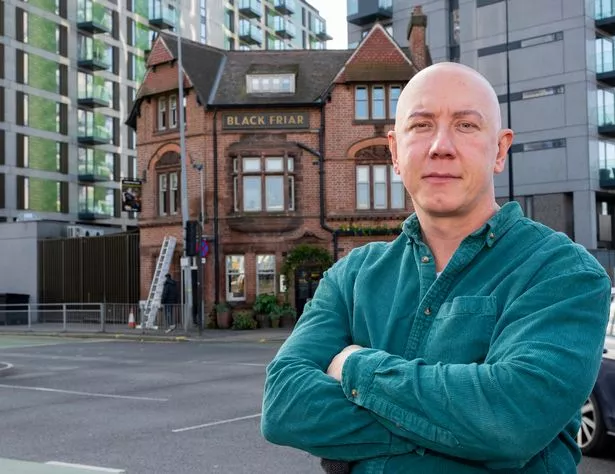 Neil Burke, landlord of the gastro pub The Black Friar in Salford(Image: Andy Stenning/Daily Express)
Neil Burke, landlord of the gastro pub The Black Friar in Salford(Image: Andy Stenning/Daily Express)
The reforms, which are still subject to an initial Call for Evidence, could also put the responsibility on developers when it comes to soundproofing their buildings if they are built near existing pubs, clubs or music venues.
It would mean that businesses could potentially avoid having to go through similar experiences as the owners of Night & Day in the Northern Quarter, which was subjected to a lengthy three-year court battle with the council over noise complaints. It was eventually decided the venue could continue operating, but with noise-limiting restrictions in place.
“At the moment, developers are digging deep into their pockets to secure land and probably have had quite a bit of a leg-up because of that,” Neil says. “So, in terms of soundproofing, I think that could be really effective in terms of not putting the cost on the business to remodel their whole venue after people in the new development next door start to complain.”
In Deansgate, Pádraig Brady runs Mulligans, which is the oldest Irish bar in the city and is based within a building that dates back over 150 years. He too thinks the soundproofing reforms could be good for the industry.
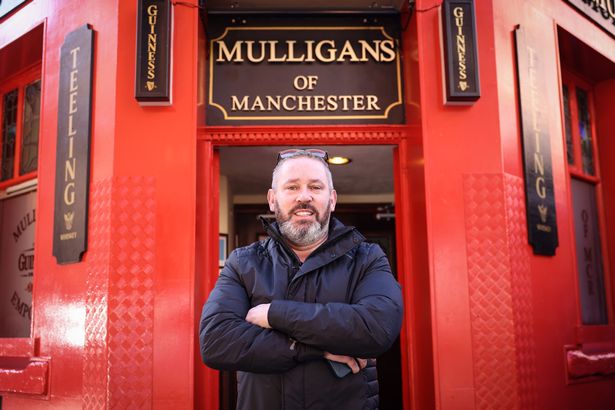 Mulligans owner Pádraig Brady says he welcomes the proposed reforms on hospitality zones and soundproofing responsibilities
Mulligans owner Pádraig Brady says he welcomes the proposed reforms on hospitality zones and soundproofing responsibilities
“I’ve long wished that there would be protections in place for this,” he explains. “If a developer was to drop plans for 50 apartments next door to us and then, all of a sudden, us as a business which has existed for 150 years has to change how it operates, how is that fair? There shouldn’t be an expectation for venues to turn away their main operating income just because someone has decided to build next to them.”
One aspect that has got some businesses interested is the idea of the new ‘hospitality zones’ that would encourage outdoor drinking and dining and welcome more street parties.
“I don’t think there’s many people who have been to the Mediterranean and not been envious of the outside eating and drinking culture they’ve got over there,” Mof Gimmers, the Marketing and Events Manager for venues including Bunny Jackson’s, BJ’s Country Club and Lost Cat, says.
“While we might not have the Med’s weather, in principle, if pubs can be a bit more spontaneous with their events and take advantage of any random bursts of good weather then it’s a fun idea.”
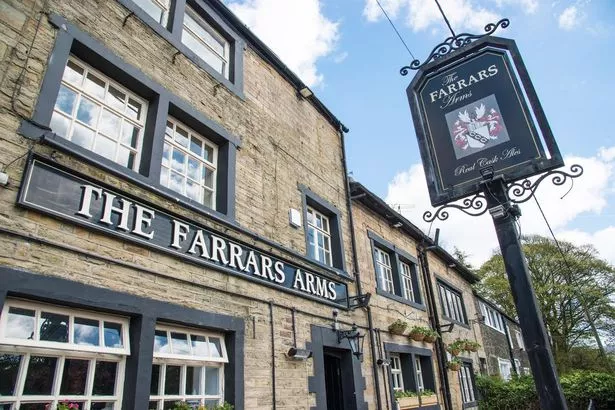 Rob, of the Farrars Arms in Oldham, said ‘anybody who is still here today has already had to adapt many times in order to survive'(Image: Manchester Evening News)
Rob, of the Farrars Arms in Oldham, said ‘anybody who is still here today has already had to adapt many times in order to survive'(Image: Manchester Evening News)
The reforms could also ease some of the stringent restrictions when it comes to what customers can and can’t do whilst enjoying themselves outside their venues.
Earlier this year, BJ’s Country Club, on High Street in the Northern Quarter, ruffled a few feathers with some ‘cheeky’ signs that highlighted the specifics of outdoor licensing rules from Manchester Council – notably that guests ‘cannot stand up and drink, but you can sit down and drink’.
“We were just having a bit of fun really,” Mof said of the signs, which appeared outside the venue in June. “But maybe our signs were exactly the kind of “clunky, outdated rules” that the current government was referring to in their latest statement.”
Jobe Ferguson, who is behind venues like the Bay Horse Tavern, Smithfield Social and Cane and Grain all on Thomas Street in the Northern Quarter, agrees that it could be time for a shift on the specifics of what guests can and can’t do when it comes to outside drinking.
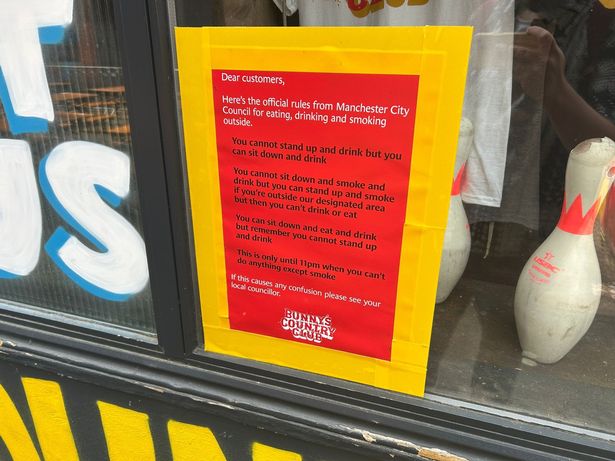 The ‘cheeky’ sign outside Bunny’s Country Club in the Northern Quarter regarding outside drinking rules
The ‘cheeky’ sign outside Bunny’s Country Club in the Northern Quarter regarding outside drinking rules
“The rules can be really annoying,” Jobe explains. “Customers think we are treating them like children and telling them off because we’ve got to make sure they’re sitting at the table and not standing up, and they have to have their drinks in plastic cups.
“I don’t understand the reasoning over vertical drinking. If someone is kicking off, I don’t think it really makes a difference if they’re sat down or stood up. You can walk past any pub in London and it’ll be full of people standing outside with a pint in a glass and having a good time.
And when the Christmas Markets are on, there are people who will walk around with drinks in their hand with no problem. So, it’s just a bit of a funny one for us.”
Jobe says that recent events in the Northern Quarter have shown that outdoor drinking can be done right in terms of safety and in supporting trade.
“During the Oasis gigs, we had the Northern Quarter Block Party going on and it was just such an amazing atmosphere,” he explains. “The council eased a few of its rules for that and it meant we could remove some tables and people could stand up if they wanted to.
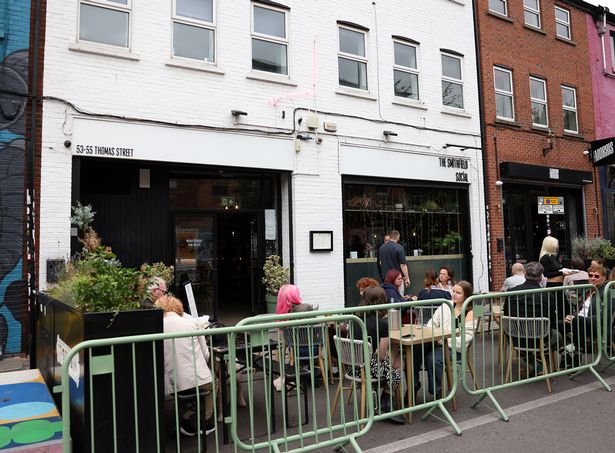 The owners of Smithfield Social said they had a record week during the Northern Quarter Block Party, which was held at the same time as the Oasis gigs(Image: Manchester Evening News)
The owners of Smithfield Social said they had a record week during the Northern Quarter Block Party, which was held at the same time as the Oasis gigs(Image: Manchester Evening News)
“It increased our capacity more and had a really positive impact on business. We had a record week for the Smithfield Social and for Crazy Pedros on Bridge Street, which came at just the perfect time because June was terrible for us. It was a much needed bit of respite financially.”
Padraig at Mulligans says he already has an idea in mind for a new ‘hospitality zone’ near his venue, and thinks the reform could be ‘brilliant’ for business.
“As the city moves towards no cars and being more pedestrianised, it leaves an awful lot of side roads and back lanes which end up being used as rat runs,” he explains.
“Southgate outside of Mulligans could be used for deliveries in the morning and then we could put tables and chairs out and turn it into a vibrant space. It would increase revenue for us, it would benefit the council, and it would also put a stop to the rat runs. It would be a win-win really.
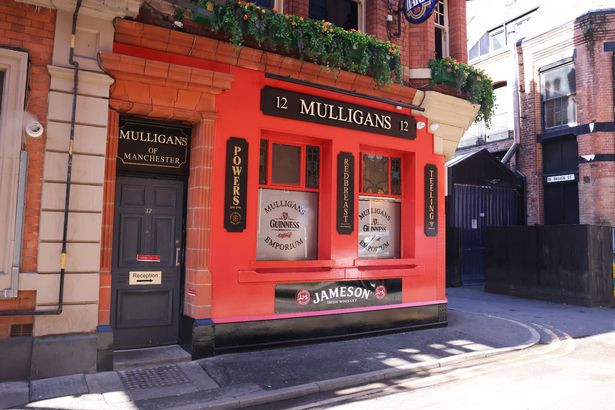 Mulligans would like to have a new ‘hospitality zone’ outside its venue, which would create a ‘vibrant area’ for customers
Mulligans would like to have a new ‘hospitality zone’ outside its venue, which would create a ‘vibrant area’ for customers
“We all know that the hospitality industry is facing a very difficult time with all the increases and, sadly, I don’t think the Government will lower taxes on businesses because they can’t afford to. The country as a whole just can’t afford it, so maybe we just need to start thinking smart about what else could be done to help us.”
For Rob at the Farrars Arms, he believes that ‘quantifiable reforms’ would be better proposed by the government so far. “When the VAT was reduced during Covid, we were able to see notifiable changes,” he explains.
“Politicians work on the idea that they need to be shown to be doing something. I think there’s a level of appreciation where it could have so much better if they hadn’t dropped both the minimum national wage and the business rates increases on us at the same time.
“It’s just these really big huge increases all at once that means we can’t refill the pot ahead of the quiet periods after the winter, and that’s a big worry for many of us. I think in the next few months there is going to be lots of bad news coming our way.”
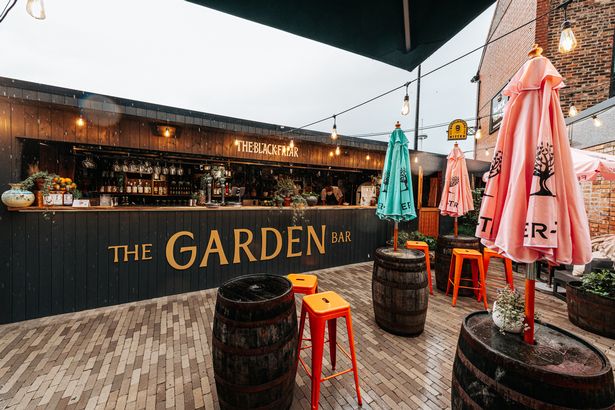 Neil Burke, of the Black Friar, says its hard to find an acceptable price point whilst still managing increased costs and lower margins(Image: Supplied)
Neil Burke, of the Black Friar, says its hard to find an acceptable price point whilst still managing increased costs and lower margins(Image: Supplied)
Mof, at Bunny Jackson’s, adds: “Relaxing some of the red tape feels like a good idea, but if businesses in the community are still being hit hard with rates, spiralling bills, and everyone’s suppliers and customers are dealing with the same costs, so relaxed rules can only do so much. Without being cynical though, it’s nice that this is being looked at in some regard.”
Neil says that, in the face of rising costs, businesses have had to adapt and change as a result. The Black Friar for example now has a bigger focus on hosting weddings and events. But it’s also come at the cost of upsetting some customers.
He explains: “We get a lot of bookings for weddings and events, which we are very fortunate for, and we had put a cap in place to ensure we weren’t closing for customers too often. I never wanted to close more than two Saturdays in a month, for example.
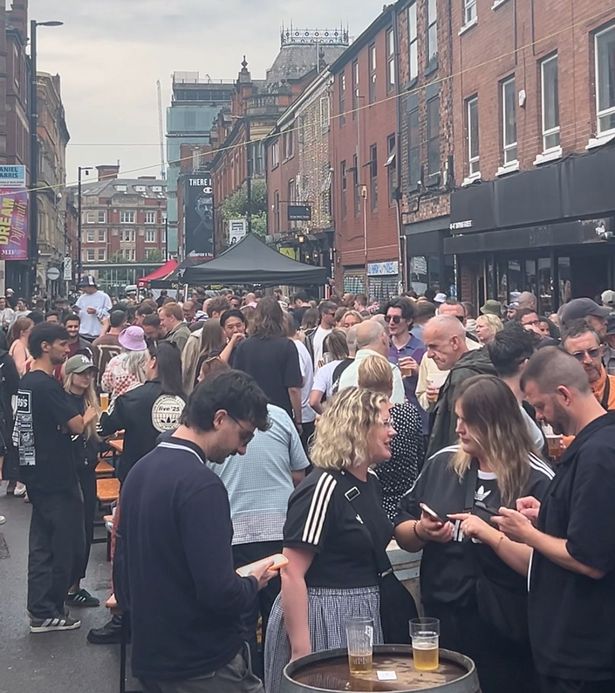 People enjoying the Northern Quarter Block Party on Thomas Street during the Oasis gigs
People enjoying the Northern Quarter Block Party on Thomas Street during the Oasis gigs
“But we’re totally having to backtrack on that now because it’s guaranteed money for us. We’ve had complaints from customers that we’ve been closed when they’ve visited but we possibly won’t survive if we don’t adapt.”
Whilst it is a difficult time for the industry, those within it are still keen to showcase the very best in what they do – and to make a success despite the challenges thrown at them.
“When it boils down to it, most people love a good pub, café or restaurant,” Mof explains. “It’s extremely important to have somewhere to be with people that isn’t your home or the place you work. Pubs, cafes and restaurants have been hugely important in that regard. Socialising for the sake of it is a great thing, and towns and cities are defined by their venues.”
Rob adds: “We all got into this industry knowing fully well that the margins were never going to be the biggest, so anybody who is still here today has already had to adapt many times in order to survive.
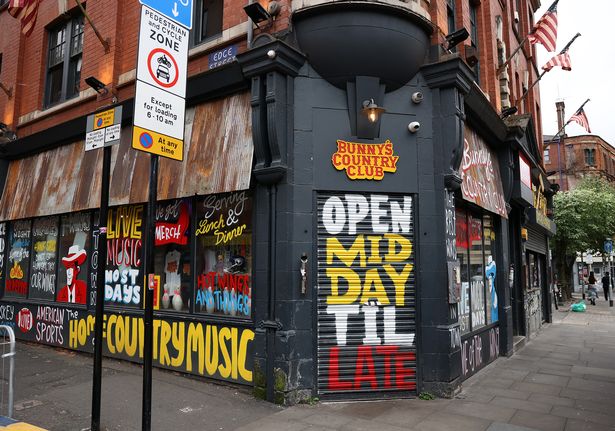 Venues said they would appreciate an ease on outdoor drinking rules which would make it easier for people to enjoy themselves(Image: Manchester Evening News)
Venues said they would appreciate an ease on outdoor drinking rules which would make it easier for people to enjoy themselves(Image: Manchester Evening News)
“We don’t want handouts, we don’t want people to feel sorry for us, that’s not the name of the game. We just want to be able to make relatively low percentages on our turnover, we want to be able to reinvest in our buildings, and we want to have the right staff that are working optimally rather than feeling overworked.”
A spokesperson for Manchester City Council said: “Although we do not yet know the detail of the proposed new framework, we are looking forward to receiving them and working to ensure that any changes to the law can best serve the people of Manchester and its range of licensed venues.
“On the whole we have a positive and reciprocal relationship with the businesses that engage with licensing and when issues arise we do our best to ensure that a positive outcome can be arrived at.”
